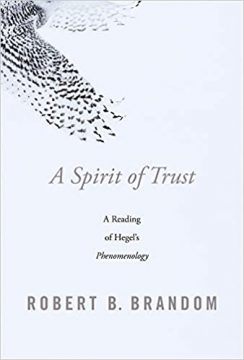Crispin Sartwell in the Los Angeles Review of Books:
 ROBERT BRANDOM IS one of the few living philosophers who can, without exaggeration, be compared to the philosophical giants who once bestrode the earth, or at least loomed large in the study, from the 17th through the 19th centuries: Spinoza, Leibniz, Hume, Kant, Hegel — system-builders who intended to explain all of reality, and ourselves, to ourselves, insofar as we and it were explicable (a matter about which they disagreed). Brandom’s long-awaited book A Spirit of Trust is an achievement in that classical vein, and quite a surprising one in this period of punctilious specialists.
ROBERT BRANDOM IS one of the few living philosophers who can, without exaggeration, be compared to the philosophical giants who once bestrode the earth, or at least loomed large in the study, from the 17th through the 19th centuries: Spinoza, Leibniz, Hume, Kant, Hegel — system-builders who intended to explain all of reality, and ourselves, to ourselves, insofar as we and it were explicable (a matter about which they disagreed). Brandom’s long-awaited book A Spirit of Trust is an achievement in that classical vein, and quite a surprising one in this period of punctilious specialists.
Many streams run together in Brandom’s philosophy, which emerges from the American pragmatism of C. S. Peirce and John Dewey; from many strands of analytic philosophy, including those emanating from Gottlob Frege, Ludwig Wittgenstein, and W. V. Quine; from the “Pittsburgh School” of Wilfrid Sellars and John McDowell (Brandom himself has spent his entire career at the University of Pittsburgh); and, it turns out, from G. W. F. Hegel.
But this book, and Brandom’s now-vast oeuvre as a whole, is much more than synthetic: A Spirit of Trust amounts to a comprehensive, coherent, original philosophical system extending across philosophy of language, metaphysics, epistemology, philosophy of history, ethics, and even political philosophy.
More here.
